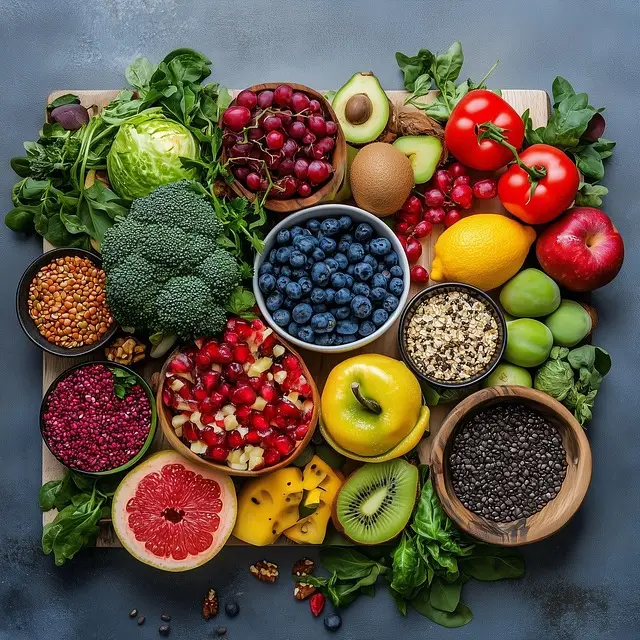Simple Healthy Eating Habits That Can Transform Your Fitness Journey

Discover practical, science-backed eating habits that can dramatically improve your fitness results, energy levels, and overall wellbeing without complicated diets.
Simple Healthy Eating Habits That Can Transform Your Fitness Journey
The path to fitness success isn't just paved with workout routines—it's significantly influenced by what happens in your kitchen. While exercise is crucial, nutrition provides the foundation that determines how effectively your body performs, recovers, and transforms. The good news? You don't need complicated diet plans or extreme restrictions to see remarkable results.
This guide focuses on simple, sustainable eating habits that can dramatically enhance your fitness journey, regardless of whether you're just starting out or looking to break through a plateau.
Understanding the Nutrition-Fitness Connection
How Food Impacts Your Fitness
-
Energy availability
- Fueling workouts
- Supporting daily activities
- Maintaining metabolic function
- Preventing fatigue
- Optimizing performance
-
Recovery mechanisms
- Muscle repair processes
- Glycogen replenishment
- Inflammation management
- Hormonal balance
- Immune system support
-
Body composition effects
- Muscle protein synthesis
- Fat utilization
- Water balance
- Bone density
- Metabolic efficiency
The Mindset Shift
-
From diet to lifestyle
- Sustainable vs. temporary
- Identity-based changes
- Habit formation focus
- Enjoyment priority
- Long-term perspective
-
From restriction to addition
- Focus on including nutrients
- Crowding out less healthy options
- Abundance mentality
- Positive relationship with food
- Nutritional adequacy first
Foundational Habits for Transformation
Habit 1: Prioritize Protein at Every Meal
The Science
Protein serves as the building block for muscle tissue and plays a crucial role in recovery, satiety, and metabolic health. Research shows that distributing protein intake throughout the day (rather than consuming it primarily at dinner) optimizes muscle protein synthesis and improves body composition outcomes.
Practical Implementation
-
Target amounts
- General guideline: 1.6-2.2g per kg of bodyweight daily
- For most meals: 25-40g of protein
- Post-workout: 20-40g within 2 hours
- Before bed: 20-40g casein or slow-digesting protein
-
Quality sources
- Animal-based: Eggs, poultry, fish, lean meats, dairy
- Plant-based: Legumes, tofu, tempeh, seitan, protein powders
- Combination approaches for complete amino profiles
- Minimally processed options when possible
- Variety for micronutrient diversity
-
Simple strategies
- Prep protein sources in batch for easy access
- Keep ready-to-eat options available (Greek yogurt, protein shakes)
- Start meals by eating the protein portion first
- Include a protein source in snacks
- Use protein as the meal-planning centerpiece
Transformation Impact
Consistent protein prioritization can lead to improved satiety, better muscle retention during weight loss, enhanced recovery between workouts, and a higher resting metabolic rate due to increased lean mass.
Habit 2: Embrace Vegetable Volume
The Science
Vegetables provide essential micronutrients, fiber, and phytochemicals while being low in calories. The fiber content supports gut health, which research increasingly links to everything from immune function to hormone regulation. Additionally, the volume of vegetables helps create physical fullness with minimal caloric impact.
Practical Implementation
-
Quantity targets
- Aim for 3-5 cups of non-starchy vegetables daily
- Include at least one serving at each meal
- Focus on variety of colors
- Emphasize leafy greens
- Incorporate both raw and cooked options
-
Flavor enhancement strategies
- Roasting to bring out natural sweetness
- Proper seasoning (herbs, spices, citrus)
- Healthy fat addition for satisfaction
- Texture contrasts for interest
- Cooking method variation
-
Convenience approaches
- Pre-cut options for busy days
- Frozen vegetables as backup
- Simple preparation methods
- Batch cooking for the week
- Blending into smoothies or sauces
Transformation Impact
Increasing vegetable intake improves nutrient density, supports digestive health, enhances recovery through antioxidants, and creates sustainable fullness that can prevent overeating of more calorie-dense foods.
Habit 3: Hydrate Strategically
The Science
Even mild dehydration (1-2% of body weight) can impair physical performance, cognitive function, and metabolic processes. Water is essential for nutrient transport, temperature regulation, joint lubrication, and cellular function. Many people confuse thirst with hunger, leading to unnecessary calorie consumption.
Practical Implementation
-
Daily targets
- Minimum: 3-4 liters total fluid intake
- Activity adjustment: Add 500-750ml per hour of exercise
- Environmental adjustment: Increase in heat or humidity
- Individual variation: Monitor urine color (pale yellow ideal)
- Consistency throughout day
-
Hydration timing
- 500ml upon waking
- 500ml 30 minutes before meals
- 250ml every hour during workday
- 500-750ml per hour during exercise
- Limited fluid 2 hours before bed
-
Flavor enhancement (for increased compliance)
- Citrus slices
- Cucumber or berries
- Fresh herbs (mint, basil)
- Very diluted electrolyte mixes
- Herbal teas (hot or cold)
Transformation Impact
Proper hydration enhances workout performance, improves recovery, supports metabolic function, reduces false hunger signals, and improves overall energy levels and cognitive function.
Habit 4: Master Meal Timing and Structure
The Science
While total daily nutrition is most important, meal timing and structure can optimize energy levels, workout performance, and recovery. Research shows that consistent meal patterns help regulate hunger hormones, stabilize blood sugar, and support circadian rhythms that influence metabolism.
Practical Implementation
-
Meal frequency
- Individualized approach (3-6 meals based on preference)
- Consistent daily pattern
- 3-5 hour spacing between meals
- Protein distribution throughout day
- Carbohydrate timing around activity
-
Meal structure template
- Protein source (palm-sized portion)
- Fiber-rich carbohydrates (fist-sized portion)
- Healthy fats (thumb-sized portion)
- Vegetables (at least half the plate)
- Hydration alongside
-
Workout nutrition windows
- Pre-workout: 1-3 hours before (complete meal) or 30-60 minutes before (small snack)
- During: Hydration for sessions under 90 minutes; carbs for longer sessions
- Post-workout: Protein within 2 hours; carbohydrates based on next training session
- Recovery days: Slightly lower carbohydrates, maintained protein
Transformation Impact
Strategic meal timing and structure optimizes energy for workouts, enhances recovery processes, stabilizes hunger and energy throughout the day, and creates a sustainable framework for nutritional consistency.
Habit 5: Prepare for Success
The Science
Environment strongly influences eating behavior, often more powerfully than willpower alone. Research in behavioral psychology shows that making healthy choices more convenient and unhealthy choices less accessible significantly impacts dietary adherence and long-term success.
Practical Implementation
-
Weekly meal preparation
- 2-3 hour weekend session
- Batch cooking proteins
- Washing and prepping vegetables
- Portioning snacks
- Preparing breakfast components
-
Kitchen organization
- Healthy foods at eye level in fridge
- Nutritious snacks in visible locations
- Less optimal choices stored out of sight
- Quality storage containers
- Efficient meal-prep tools
-
Environmental optimization
- Dining table free of distractions
- Smaller plates for portion management
- Water readily available
- Healthy snacks for travel/work
- Restaurant strategies prepared in advance
Transformation Impact
Preparation removes decision fatigue, eliminates the "no time" barrier, ensures nutritious options are always available, reduces impulsive choices, and creates a supportive environment for consistent healthy eating.
Advanced Habits for Continued Progress
Habit 6: Develop Mindful Eating Practices
The Science
Research shows that eating while distracted leads to greater calorie consumption and reduced meal satisfaction. Mindful eating—paying full attention to the eating experience—improves digestion, enhances satisfaction, and helps develop a healthier relationship with food.
Practical Implementation
-
Distraction elimination
- No screens during meals
- Designated eating spaces
- Seated meals
- Set meal times
- Single-task eating
-
Awareness practices
- Pre-meal pause (5 deep breaths)
- Noticing hunger/fullness cues
- Chewing thoroughly (20-30 times per bite)
- Putting utensils down between bites
- Appreciating flavors and textures
-
Hunger-fullness monitoring
- 1-10 scale awareness
- Starting meals at 3-4 (moderately hungry)
- Ending meals at 6-7 (satisfied, not stuffed)
- Waiting 20 minutes before second helpings
- Regular check-ins during meals
Transformation Impact
Mindful eating naturally regulates portion sizes, improves digestion and nutrient absorption, enhances meal satisfaction, reduces stress eating, and builds a healthier psychological relationship with food.
Habit 7: Cycle Carbohydrates Strategically
The Science
Carbohydrate needs vary based on activity levels, training intensity, and individual factors. Strategic carbohydrate cycling—adjusting intake based on activity—can optimize body composition while supporting performance and recovery when it matters most.
Practical Implementation
-
Training day approach
- Higher carbohydrates (3-5g/kg bodyweight)
- Timed around workout (before, during for long sessions, after)
- Focus on quality sources (fruits, vegetables, whole grains, legumes)
- Moderate fat intake
- Maintained protein levels
-
Rest day modifications
- Reduced carbohydrates (1-3g/kg bodyweight)
- Emphasis on fiber-rich sources
- Increased healthy fats for satiety
- Maintained protein levels
- Vegetable volume increase
-
Individual adjustment
- Performance monitoring
- Recovery quality assessment
- Energy level tracking
- Sleep quality feedback
- Body composition response
Transformation Impact
Strategic carbohydrate cycling can improve insulin sensitivity, enhance fat utilization, support optimal training performance, and create metabolic flexibility while maintaining social eating flexibility.
Implementation Strategy
Start Small: The Habit Stacking Approach
- Begin with one habit for 2-3 weeks
- Add second habit only after first becomes automatic
- Link new habits to existing routines
- Celebrate small wins consistently
- Focus on consistency over perfection
Tracking for Awareness (Not Obsession)
- Simple food journal (focus on behaviors, not just calories)
- Weekly review and reflection
- Adjustment based on results and feedback
- Progress photos and measurements
- Performance and energy monitoring
Managing Social Situations
- The 80/20 approach (flexibility for social events)
- Pre-planning strategies
- Restaurant menu research
- Hunger management before events
- Focus on connection rather than food
Overcoming Common Obstacles
Time Constraints
- Batch cooking solutions
- Simple meal templates
- Healthy convenience options
- Time-saving kitchen tools
- Prioritization strategies
Plateau Management
- Nutrition tracking reset
- Portion awareness check
- Hidden calorie assessment
- Meal timing optimization
- Professional guidance when needed
Emotional Eating Patterns
- Trigger identification
- Alternative coping strategies
- Environment modification
- Support system development
- Stress management techniques
Conclusion
Transforming your fitness journey through nutrition doesn't require extreme diets or complicated meal plans. These seven foundational habits—prioritizing protein, embracing vegetables, hydrating strategically, mastering meal timing, preparing for success, eating mindfully, and cycling carbohydrates—create a sustainable framework that supports your fitness goals.
Remember that consistency trumps perfection. Rather than attempting a complete nutritional overhaul, focus on implementing one habit at a time until it becomes automatic. This gradual approach leads to lasting change rather than temporary results.
Your nutrition should enhance your life and support your fitness goals without creating unnecessary stress or restriction. By focusing on these simple yet powerful habits, you'll develop a sustainable approach to eating that fuels performance, supports recovery, and transforms your fitness journey for the long term.

